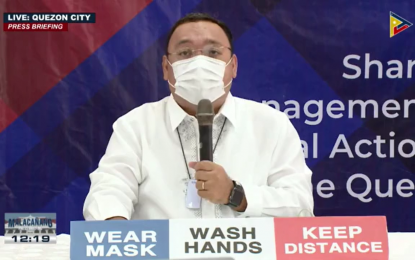
Presidential Spokesperson Harry Roque. (File photo)
MANILA – The proposed establishment of a virology institute following the coronavirus disease 2019 (Covid-19) outbreak is seen as one of the “long-term” plans to improve the local vaccine development in the country, Malacañang said on Friday.
Presidential Spokesperson Harry Roque said that while the Philippines participates in the global action to develop a Covid-19 vaccine, it has to look for a “long-term” plan that would benefit the country in the near future.
To make it happen, President Rodrigo Duterte is now studying the proposal to create a Virology Science and Technology Institute of the Philippines (VIP), Roque said in a statement.
“Our concern, however, also involves long-term plans. President Rodrigo Roa Duterte is now reviewing the recommendation to establish a Virology Science and Technology Institute of the Philippines that will serve as a premiere research institute in virology and diseases to strengthen local vaccine development in the country,” he said.
The proposed VIP will serve as a premier research institute in virology and diseases in humans, animals, and plants, the Department of Science and Technology (DOST) earlier said.
The VIP will also conduct scientific research on viral ecology, clinical virology, vector transmission, pathogenesis, pathophysiology, among others.
The development of vaccines, diagnostics, and therapeutics will also be made possible through the establishment of the research center.
Roque ensured that the government’s scientists continue to work “diligently” to find local treatment for Covid-19 patients.
He gave the assurance after critics slammed the government for supposedly being stuck in instructing the public to wear face masks and face shields to protect themselves against Covid-19.
“The DOST recently approved the clinical trial for lagundi and the clinical trial for tawa-tawa as supplement Covid-19 treatments. These trials are in addition to the melatonin, convalescent plasma, and virgin coconut oil trials,” Roque said.
Roque also said the country has been in touch with several institutions to collaborate on vaccine development and allow local manufacturing, if possible.
“Our country is part of the World Health Organization Solidarity Trials for Covid-19 treatments,” he said.
The “Solidarity Trial” is an international clinical trial launched by the World Health Organization and its partners to test the safety and effectiveness of possible vaccines against Covid-19.
Roque likewise said members of the Inter-Agency Task Force for the Management of Emerging Infectious Diseases have been tasked to assist local government units (LGUs) in a bid to minimize the spread of Covid-19 in the country.
He said the national government wants to make sure that the operational aspect of the National Action Plan Against Covid-19 will be properly implemented down to the village levels.
“The assignment of Inter-Agency Task Force members to LGUs, we reiterate, is to ensure close coordination between the national government and LGUs and to harmonize the policies being crafted by the IATF and the operational framework that is being implemented on the ground,” Roque said.
In July, the IATF-EID approved the proposed second phase of the National Action Plan that contains measures against Covid-19. (PNA)
